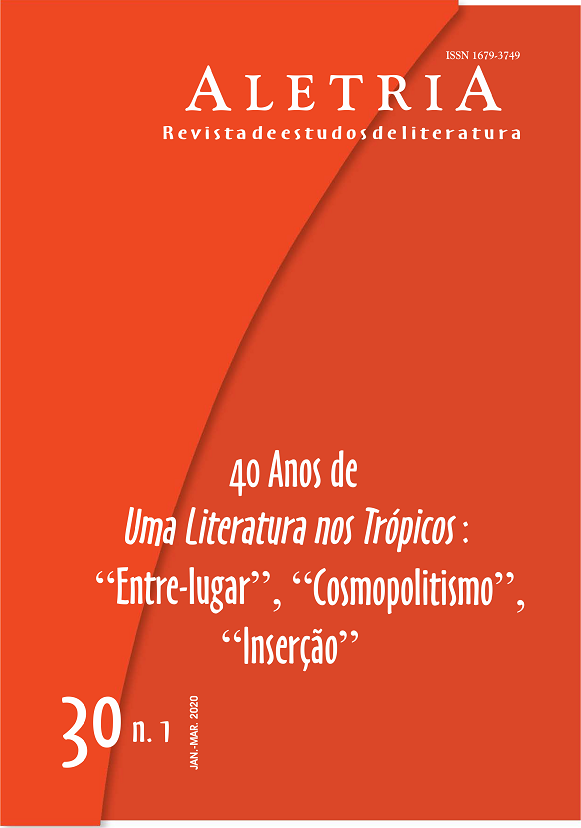Caetano Veloso and the Turn of Culture: Reading Devices by Silviano Santiago
DOI:
https://doi.org/10.17851/2317-2096.30.1.173-187Keywords:
Caetano Veloso, in-between, anthropophagy, tropicalism, cultural industryAbstract
This article aims at analyzing the reading device created by Silviano Santiago in his investigation of the cultural turning point that repositioned literary studies and the relations between Art and Politics in the late 1970s in Brazil. This article elects three essays by Santiago, elaborated at different moments of his intellectual trajectory, from which I seek to identify common critical procedures that characterize a singular manner of approaching the object. Its recurrence reveals an obsession of the critic for the inflections and decentrations in the order of culture. The emphasis is on the figure of Caetano Veloso and his anthropophagic attitude. Velosos’s work, in confluence with that of Santiago, combines elements of different cultural records, in order to reveal the ambiguities and paradoxes established between the aesthetic and the political field, between art and culture, in the process of conservative modernization of Brazilian society.
Downloads
References
AGAMBEN, Giorgio. O que é o contemporâneo? e outros ensaios. Chapecó: Argos, 2009.
CAMPOS, Haroldo de. Da razão antropofágica: diálogo e diferença na cultura brasileira. In: Metalinguagem e outras metas. São Paulo: Perspectiva, 2006. p. 231-256.
COELHO, Frederico (org.). Silviano Santiago. Rio de Janeiro: Beco do Azougue, 2001. (Coleção Encontros).
CUNHA, Eneida Leal (org.). Leituras crítica de Silviano Santiago. Belo Horizonte/São Paulo: Editora UFMG: Fundação Perseu Abramo, 2008.
DELEUZE, Gilles. Diferencia y repetición. Buenos Aires: Amorrortu, 2002.
PAULO, Eloésio. Dez pecados de Paulo Coelho. Sabará: Dubolso Digital, 2014.
SANTIAGO, Silviano. Democratização no Brasil 1979-1981 (cultura versus arte). In: ANTELO, Raul (org.). Declínio da arte, ascensão da cultura. Florianópolis: Abralic, 1998. p. 11-24.
SANTIAGO, Silviano. A moda como metáfora contemporâneo. In: BOTELHO, André; STARLING, Heloísa. República e democracia: impasses do Brasil contemporâneo. Belo Horizonte, Ed. UFMG, 2017. p. 225-246
SANTIAGO, Silviano. O começo do fim. Gragoatá, Niterói, n. 24, p. 13-30, 1. sem. 2008.
SANTIAGO, Silviano. O cosmopolitismo do pobre. In: ______. O cosmopolitismo do pobre. crítica literária e crítica cultural. Belo Horizonte: Editora UFMG, 2004. p. 45-73.
SANTIAGO, Silviano. Ora (direis) puxar conversa!. Belo Horizonte: Editora UFMG, 2006. p. 209-214.
SANTIAGO, Silviano. Para além da história social. In: ______. Nas malhas da letra. Rio de Janeiro: Rocco, 2002. p. 251-271.
SANTIAGO, Silviano. Uma literatura nos trópicos. Rio de Janeiro: Rocco, 2000.
SCARLLET, Marton. Nietzsche: das forças cósmicas aos valores humanos. Belo Horizonte: Editora UFMG, 2010.
SCHWARZ, Roberto. Verdade tropical: um percurso de nosso tempo. In: ______. Martinha versus Lucrécia. São Paulo: Companhia das Letras, 2012. p. 155-356.
VELOSO, Caetano. Verdade tropical. São Paulo: Companhia das Letras, 1999.
Downloads
Published
How to Cite
Issue
Section
License
Copyright (c) 2020 Roberto Alexandre do Carmo Said (Autor)

This work is licensed under a Creative Commons Attribution 4.0 International License.
Authors who publish with this journal agree to the following terms:Authors retain copyright and grant the journal right of first publication with the work simultaneously licensed under a Creative Commons Attribution Non-Commercial No Derivatives License that allows others to share the work with an acknowledgement of the work's authorship and initial publication in this journal.Authors are able to enter into separate, additional contractual arrangements for the non-exclusive distribution of the journal's published version of the work (e.g., post it to an institutional repository or publish it in a book), with an acknowledgement of its initial publication in this journal.Authors are permitted and encouraged to post their work online (e.g., in institutional repositories or on their website) prior to and during the submission process, as it can lead to productive exchanges, as well as earlier and greater citation of published work (See The Effect of Open Access).





